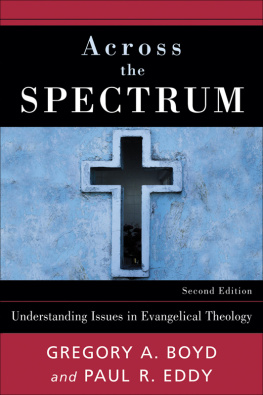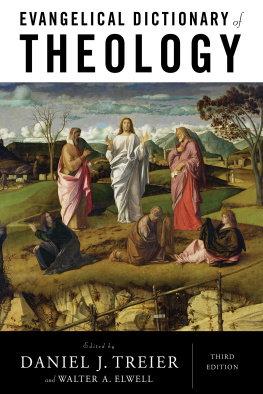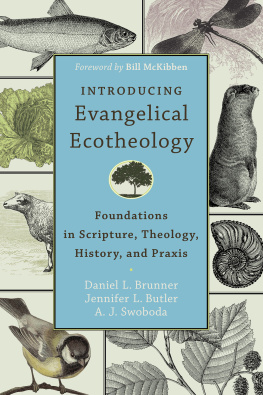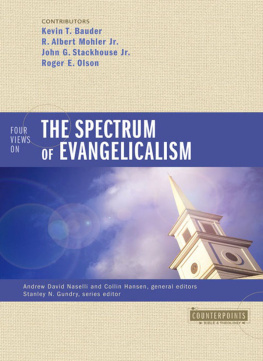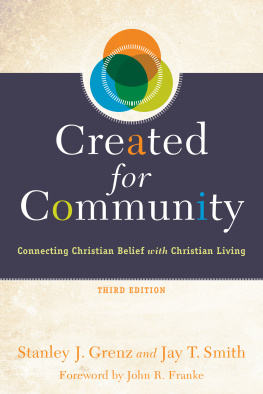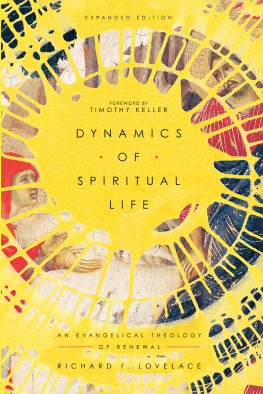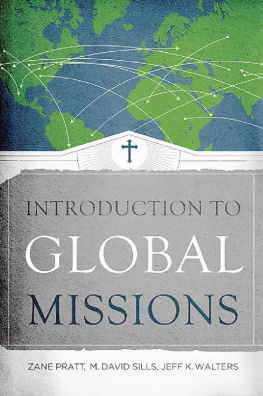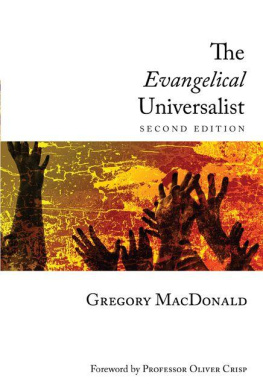Across
the
SPECTRUM
Across
the
SPECTRUM
Understanding Issues in Evangelical Theology
Second Edition
GREGORY A. BOYD
AND PAUL R. EDDY

2002, 2009 by Gregory A. Boyd and Paul R. Eddy
Published by Baker Academic
a division of Baker Publishing Group
P.O. Box 6287, Grand Rapids, MI 49516-6287
www.bakeracademic.com
Second edition published in 2009
Ebook edition created 2010
Ebook corrections 6.8.2012
All rights reserved. No part of this publication may be reproduced, stored in a retrieval system, or transmitted in any form or by any meansfor example, electronic, photocopy, recordingwithout the prior written permission of the publisher. The only exception is brief quotations in printed reviews.
ISBN 978-1-5855-8285-3
Library of Congress Cataloging-in-Publication Data is on file at the Library of Congress, Washington, DC.
Unless otherwise indicated, Scripture quotations are from the New Revised Standard Version of the Bible, copyright 1989, by the Division of Christian Education of the National Council of the Churches of Christ in the United States of America. Used by permission. All rights reserved.
Unless otherwise indicated, all Scripture quotations are from the Holy Bible, New International Version. NIV. Copyright 1973, 1978, 1984 by Biblica, Inc. Used by permission of Zondervan. All rights reserved worldwide. www.zondervan.com
To
our children,
Denay, Alisha, and Nathan,
and Jordan, Juston, and Rachel,
and to
our grandchildren,
Soel and Sage,
and Rylie
Contents
Without Error of Any Kind (The Inerrantist View)
Infallible in Matters of Faith and Practice (The Infallibilist View)
All Things Happen according to Gods Sovereign Will (The Calvinist View)
God Limits His Control by Granting Freedom (The Arminian View)
God Foreknows Future Free Actions (The Arminian View)
God Foreknows by Sovereignly Ordaining the Future (The Calvinist View)
God Foreknows All That Shall Be and All That May Be (The Open View)
Created in the Recent Past (The Young Earth View)
A Very Old Work of Art (The Day-Age View)
Restoring a Destroyed Creation (The Restoration View)
Literary Theme over Literal Chronology (The Literary Framework View)
The Image of God Is the Soul (The Substantival View)
The Image of God Is Our God-Given Authority (The Functional View)
The Image of God Is Our Relationality (The Relational View)
The Unavoidable Paradox of the God-man (The Classical View)
Christ Relinquished His Divine Prerogatives (The Kenotic View)
Christ Died in Our Place (The Penal Substitution View)
Christ Destroyed Satan and His Works (The Christus Victor View)
Christ Displayed Gods Wrath against Sin (The Moral Government View)
TULIP (The Calvinist View)
God Wants All to Be Saved (The Arminian View)
Sanctification as a Declaration by God (The Lutheran View)
Sanctification as Holiness in Christ and in Personal Conduct (The Reformed [Calvinist] View)
Sanctification as Resting-Faith in the Sufficiency of Christ (The Keswick Deeper Life View)
Entire Sanctification as Perfect Love (The Wesleyan View)
Secure in the Power of God (The Eternal Security View)
The Need to Persist in Faith (The Conditional Security View)
No Other Name (The Restrictivist View)
God Does All He Can Do (The Universal Opportunity View)
Hope beyond the Grave (The Postmortem Evangelism View)
He Has Not Left Himself without a Witness (The Inclusivist View)
Baptism and Christian Discipleship (The Believers Baptism View)
Covenanting with the Community of God (The Infant Baptism View)
This Is My Body (The Spiritual Presence View)
In Remembrance of Me (The Memorial View)
The Gifts Are for Today (The Continuationist View)
Tongues Shall Cease (The Cessationist View)
Created Equal, with Complementary Roles (The Complementarian View)
The Irrelevance of Gender for Spiritual Authority (The Egalitarian View)
The Return before the Reign (The Premillennial View)
Working toward and Waiting for a Coming Reign of Peace (The Postmillennial View)
The Symbolic Thousand-Year Conquest of Satan (The Amillennial View)
The Unending Torment of the Wicked (The Classical View)
The Wicked Shall Be No More (The Annihilationist View)
W e would like to acknowledge several people for their support of this project. A distinct word of appreciation goes to our friend and colleague Don Alexander for contributing the bulk of the chapter on the sanctification debate. We also want to thank our good friend (and Pauls mentor) David K. Clark for contributing the section on speech act theory in the chapter on the inerrancy debate. Our appreciation also goes to our Bethel University colleagues Jim Beilby and Dan Kent for using an early draft of this text and supplying valuable feedback. To our friend and acquisitions editor at Baker Academic Robert N. Hosack, we offer our gratefulness for his encouragement and oversight of this project from conception through a second edition.
Our final word of appreciation goes to our families. Our wives, Shelley Boyd and Kelly Eddy, have offered their unfailing support throughout our various theological endeavors. Our childrenDenay, Alisha, and Nathan (Gregs), and Jordan, Juston, and Rachel (Pauls)remind us daily of the true gifts of God in this lifetime. Our grandchildrenSoel and Sage (Gregs), and Rylie (Pauls)remind us that there are precious blessings to growing older! It is to our children and grandchildren that we dedicate this book.
W e are grateful for the many students, professors, pastors, and other readers who have made use of our book over the last few years, a number of whom provided feedback and suggestions for a second edition. The primary changes in this new edition include:
rewriting The Foreknowledge Debate chapter to include three views on the topic
reducing the former Human Constitution Debate chapter to one of the issues covered in the appendix
updating the Further Reading sections at the end of each chapter
including in the book itself the appendix that was formerly online
It is our hope that this second edition will continue to serve our readers as we all, within the body of Christ, seek to live out that ancient piece of Christian wisdom: In the essential things, unity. In the nonessential things, liberty. And in all things, charity.
W hile this book will appeal to all people interested in the diversity of views that comprise evangelicalism, we have written it specifically for evangelical college students. Its purpose is to introduce these students to the range of positions evangelicals take on various disputed topics. Each position is argued from the perspective of one defending the position and is therefore presented as persuasively as possible (given the introductory nature and space limitations of this book).
This book clearly assumes a distinctly liberal arts approach to the study of theology. It presupposes that the goal of teaching is not for a teacher simply to persuade students of his or her own perspective. Rather, the goal is to broaden students minds by helping them empathetically understand a variety of perspectives while training them to think critically for themselves. The goal is not indoctrination, in other words, but the development of people who are able to arrive at their own convictions in a prayerful, critically informed mannerwhether they agree with the teacher or not.
This approach does not imply that the teacher cannot or should not be passionately committed to particular theological views, nor that he or she should altogether refrain from trying to persuade students of his or her views. But a liberal arts approach to theology does require that all views be presented in as fair and compelling a manner as possible. Students must be allowed to appreciate
Next page
